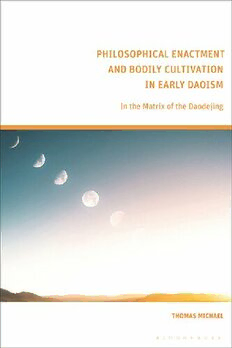
Philosophical Enactment and Bodily Cultivation in Early Daoism: In the Matrix of the Daodejing PDF
289 Pages·2023·2.131 MB·English
Most books are stored in the elastic cloud where traffic is expensive. For this reason, we have a limit on daily download.
Preview Philosophical Enactment and Bodily Cultivation in Early Daoism: In the Matrix of the Daodejing
Description:
Working with excavated texts as well as other early Chinese writings often neglected by scholars, this study reveals the clear and powerful outlines of a historical trajectory centered on the Daodejing that does not easily fit into the category of religion or philosophy but, by virtue of their fundamental non-separability, transcends both.The book closely examines the genetic relation between early Daoist bodily cultivation and the Daodejing’s philosophy of the Dao. It begins with an exploration of the ancient excavated texts of the Laozi from Guodian and Mawangdui to understand the early Daoist matrix of bodily cultivation and their relation to the Daodejing’s ideas concerning being and nothingness, and permanency versus temporalization.It then examines the Han Dynasty Heshang Gong Commentary to the Daodejing and its transformation of the teachings of the Daodejing into a political philosophy grounded in spiritual cultivation. It closes with an analysis of the writings of the Wei-Jin Daoist, Ge Hong, who describes a hidden tradition of Daoist mountain reclusion that continues to maintain the genetic relation between the Daodejing’s philosophy of Dao and the systematic practice of the early Daoist program of bodily cultivation that he identified with its teachings.
See more
The list of books you might like
Most books are stored in the elastic cloud where traffic is expensive. For this reason, we have a limit on daily download.
